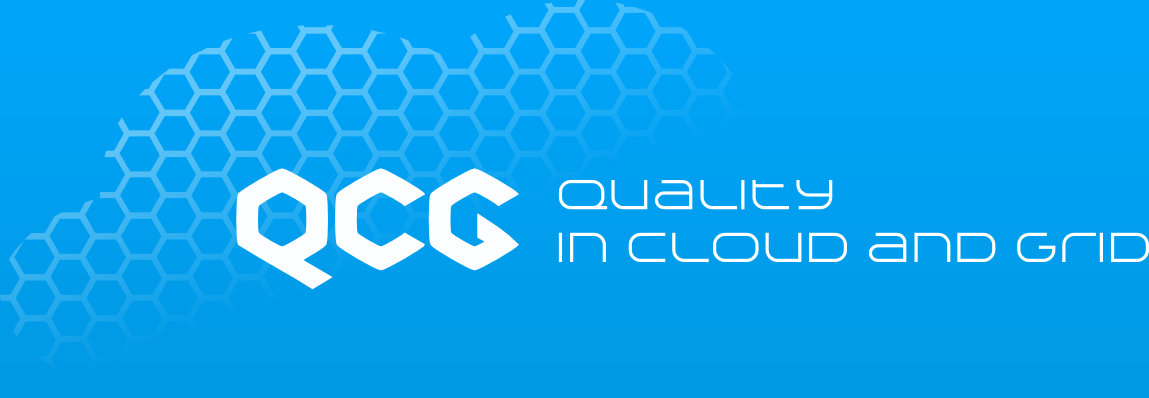QCG-BDII
The guide describes the process of integration of QCG services with the EGI Information System - Resource BDII.
The integration results in publishing information about the service in a GLUE2 complaint format through the BDII service.
The basics of EGI Information Service are described at link.
In general, information about a grid service is produced by a service provider and transfered into the closest BDII (LDAP) instance (typically co-allocated with the service).This procedure is significantly simplified with the help of tools offered by EMI Resource Information Service (emi-resource-information-service). Consequently, the integration of new services was limited to the provisioning of a few script and configuration files.
IMPORTANT: The documentation is common for all QCG services: QCG-Broker, QCG-Computing and QCG-Notifications and varies only in some points from one service to another.
Software repositories
To install QCG-BDII (BDII for one of QCG services) please configure the system with:
- one of QCG repositories, containing QCG specific extensions to the EGI information system. The RPMs are availeble for SL5 and SL6.
- EMI3 (Monte Bianco) repository, which is needed for the emi-resource-information-service metapackage, providing the EGI information system base framework.
To configure aforementioned repositories please follow the instruction: QCG Software Repositories.
Installation
In a typical YUM repositories configuration the installation of the providers comes down to the following commands:
- for QCG-Broker service:
yum install qcg-broker-egi-is-provider
- for QCG-Computing service
yum install qcg-comp-egi-is-provider
- for QCG-Notification service
yum install qcg-ntf-egi-is-provider
Repository configuration issues
It may happen that due to the fact that the newest packages of the QCG software are included in UMD repositories with a delay, the presented procedure may fail in case of specific YUM repositories configuration. If so, it may be required to divide the installation into two steps:
- In the first step the emi-resource-information-service metapackage should be installed from the UMD repository.
- In the second step a certain QCG provider should be installed from the QCG repository.
An example procedure may then look as follows:
yum install emi-resource-information-service yum --disablerepo=UMD\* install qcg-comp-egi-is-provider
Configuration
All the QCG-BDII packages need to be configured by providing the name of the BDII site, to which they intend to publish service information.
Run the command
qcg-info-site-config -s <site-ID>
to set appropriate data.
The list of available site-IDs can be found at https://goc.egi.eu/portal/index.php?Page_Type=Sites
Currently configured site-ID may be displayed as follows:
qcg-info-site-config -d site-ID=PSNC
QCG-Computing specific
For QCG-Computing it is advised to grant user ldap with permissions to use /etc/sysconfig/qcg-compd script. Otherwise the site-specific configuration may be not respected and additionally error messages may be visible in log files.
SL5 specific configuration
The BDII service requires a newer version of OpenLDAP than is available in a Scientific Linux 5 system by default. The newer version of OpenLDAP is installed as a dependecy from the UMD repository. However, the installation of a newer package entails necessity of selecting the proper OpenLDAP daemon (SLAPD) within the BDII service configuration file ('/etc/sysconfig/bdii'), eg.:
SLAPD=/usr/sbin/slapd2.4
The installation of QCG-BDII packages may pull creation of a problematic cron file for OpenLDAP server. This file is not needed and in a typical case it should be removed:
rm -f /etc/cron.daily/ldap-hot-db-backup2.4
Starting service
IMPORTANT: Before starting the QCG-BDII please ensure that the QCG services are properly configured. It is recommended to start the QCG services (or restart if services were already running) before perfomring the forthcoming steps.
The autostart of the BDII service may be configured with the following commands (invoked as root):
# the commands required only on SL5: chkconfig ldap off chkconfig ldap2.4 off # required on SL5 and SL6: chkconfig bdii on
The service itself may be run from the command line as follows:
service bdii start
By default the BDII works on port 2170.
Verification
To validate correctness of the published data the glue-validator tool can be used:
glue-validator -H localhost -p 2170 -b o=glue
